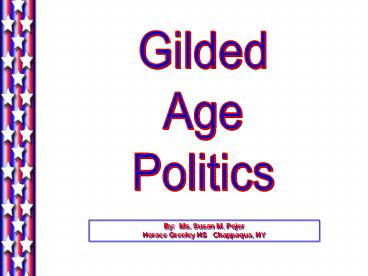Gilded Age Politics in America - PowerPoint PPT Presentation
1 / 34
Title:
Gilded Age Politics in America
Description:
Title: Gilded Age Politics in America Author: Susan M. Pojer Last modified by: Mr. and Mrs. Ross Lynde Created Date: 2/9/2004 1:39:57 AM Document presentation format – PowerPoint PPT presentation
Number of Views:279
Avg rating:3.0/5.0
Title: Gilded Age Politics in America
1
Gilded Age Politics
By Ms. Susan M. PojerHorace Greeley HS
Chappaqua, NY
2
The "Politics of Equilibrium"
3
1. A Two-Party Stalemate
4
2. Intense Voter Loyalty to theTwo
MajorPolitical Parties
5
3. Well-Defined Voting Blocs
DemocraticBloc
RepublicanBloc
- White southerners(preservation ofwhite
supremacy) - Catholics
- Recent immigrants(esp. Jews)
- Urban working poor (pro-labor)
- Most farmers
- Northern whites(pro-business)
- African Americans
- Northern Protestants
- Old WASPs (supportfor anti-immigrant laws)
- Most of the middleclass
6
4. Very Laissez Faire Federal Govt.
- From 1870-1900 ? Govt. did verylittle
domestically. - Main duties of the federal govt.
- Deliver the mail.
- Maintain a national military.
- Collect taxes tariffs.
- Conduct a foreign policy.
- Exception ? administer the annual Civil War
veterans pension.
7
5. The Presidency as a Symbolic Office
- Party bosses ruled.
- Presidents should avoid offending anyfactions
within theirown party. - The President justdoled out federal jobs.
- 1865 ? 53,000 people worked for the federal
govt. - 1890 ? 166,000
Senator Roscoe Conkling
8
1880 Presidential Election Republicans
Half Breeds
Stalwarts
Sen. James G. Blaine Sen. Roscoe
Conkling (Maine)
(New York)
compromise
James A. Garfield Chester A. Arthur (VP)
9
1880 Presidential Election Democrats
10
Inspecting the Democratic Curiosity Shop
11
1880 Presidential Election
12
1881 Garfield Assassinated!
Charles GuiteauI Am a Stalwart, and Arthur is
President now!
13
Chester A. ArthurThe Fox in the Chicken Coup?
14
Pendleton Act (1883)
- Civil Service Act.
- The Magna Carta of civil service reform.
- 1883 ? 14,000 out of117,000 federal govt.jobs
became civilservice exam positions. - 1900 ? 100,000 out of 200,000 civil service
federal govt. jobs.
15
Republican Mugwumps
- Reformers who wouldnt re-nominateChester A.
Arthur. - Reform to them ? create a disinterested,
impartial govt. run by an educated elite like
themselves. - Social Darwinists.
- Laissez faire government to them
- Favoritism the spoils system seen as govt.
intervention in society. - Their target was political corruption, not
social or economic reform!
16
TheMugwumps
Men may come and men may go, but the work of
reform shall go on forever.
- Will support Cleveland in the1884 election.
17
1884 Presidential Election
Grover Cleveland James Blaine
(DEM) (REP)
18
A Dirty Campaign
Ma, Mawheres my pa?Hes going to the White
House, ha ha ha!
19
Little Lost Mugwump
Blaine in 1884
20
Rum, Romanism Rebellion!
- Led a delegation of ministers to Blaine inNYC.
- Reference to the Democratic Party.
- Blaine was slow torepudiate the remark.
- Narrow victory forCleveland he wins NYby only
1149 votes!.
Dr. Samuel Burchard
21
1884 Presidential Election
22
Clevelands First Term
- The Veto Governor from New York.
- First Democratic elected since 1856.
- A public office is a public trust!
- His laissez-faire presidency
- Opposed bills to assist the poor aswell as the
rich. - Vetoed over 200 special pension billsfor Civil
War veterans!
23
Bravo, Señor Clevelando!
24
The Tariff Issue
- After the Civil War, Congress raisedtariffs to
protect new US industries. - Big business wanted to continue thisconsumers
did not. - 1885 ? tariffs earned the US 100 mil.
in surplus! - Mugwumps opposed it ? WHY???
- President Clevelands view on tariffs????
- Tariffs became a major issue in the
1888presidential election.
25
Filing the Rough Edges
Tariff of 1888
26
1888 Presidential Election
Grover Cleveland Benjamin Harrison
(DEM) (REP)
27
Coming Out for Harrison
28
The Smallest Specimen Yet
29
1888 Presidential Election
30
Disposing the Surplus
31
Changing Public Opinion
- Americans wanted the federal govt. to dealwith
growing soc. eco. problems to curbthe power
of the trusts - Interstate Commerce Act 1887
- Sherman Antitrust Act 1890
- McKinley Tariff 1890
- Based on the theory that prosperityflowed
directly from protectionism. - Increased already high rates another 4!
- Rep. Party suffered big losses in 1890
(evenMcKinley lost his House seat!).
32
1892 Presidential Election
Grover Cleveland Benjamin Harrison again!
(DEM) (REP)
33
1892 Presidential Election
34
Cleveland Loses Support Fast!
- The only President to serve two non-consecutive
terms. - Blamed for the 1893 Panic.
- Defended the gold standard.
- Used federal troops in the 1894Pullman strike.
- Refused to sign the Wilson-GormanTariff of 1894.
- Repealed the Sherman Silver Purchase Act.























![[PDF] America's Bank: The Epic Struggle to Create the Federal Reserve PDF PowerPoint PPT Presentation](https://s3.amazonaws.com/images.powershow.com/10110009.th0.jpg?_=20240826021)







